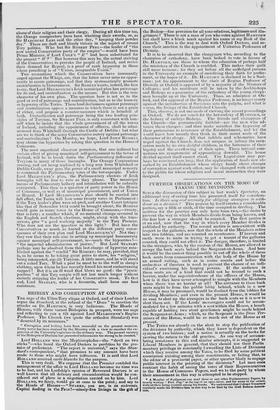FURTHER OBSERVATIONS ON THE MODE OF TAKING THE DIVISIONS.
SINCE the discussion of this subject in last week's Spectator, an additional way of saving time has presented itself for considera- tion. Is there any real necessity for obliging strangers to with- draw on a division ? This process by itself creates a considerable portion, say a fifth or sixth, of the time occupied in dividing. The motives for the practice can only have been two,—the desire to prevent the way in which Members divide from being known, and the fear lest a stranger should be counted. The first motive is at an end, now that the way in which every Member divides is published by authority. The second motive is non-existent with respect to the galleries, now that the whole of the Members retire into two lobbies, and are counted on reentrance. If heaven and earth were to unite in trying to get a tenant of the galleries counted, they could not effect it. The danger, therefore, is limited to the strangers, who, by the custom of the House, are allowed to occupy the back seats behind the Sergeant-at-Arms. And here it would be the easiest thing possible to cut off the whole of these back seats from communication with the body of the House by an armed railing, such as in assize courts and before the orchestras of theatres is used- to prevent the chance of an indi- vidual's exercising his leaping powers. If the audience in these seats are of a kind that could not be trusted to such a barrier, under the superintendence of the officers of the House, how is it they have never attempted to mingle with the Members when there was no barrier at all? The entrance to these back seats might be from the public lobby behind, which in a new House, it may be presumed, would be distinct from the lobbies for dividing Members; and even in the present House, it would be as easy to shut up the strangers in time back seats as it is now to shut them out. If the Lords' messengers could not be accom- modated for a few minutes with a scat within the House, a bench capable of holding two stout gentlemen might be made behind the Sergeant-at-Arms ; which, as the Sergeant is the Deus Ter- minus of the House, would be as much out of the House as at
present. The Tories are already on the alert to stop the publication of the divisions by authority, which they know is dependent on the system of two lobbies ; and a notice is actually on the books for moving time return to the old practice. As one way of accumu- lating resistance to this and similar attempts, it is suggested to Liberal Members in general, that they should use their Parlia mentary privilege in constantly forwarding the Lists of Divisions which they receive among the Votes, to be filed by some political association existing among their constituents, or failing that, to the editor of a provincial paper, or other quarter likely to engage public interest in the printing of the divisions.* Let men once contract the habit of seeing the votes of their Representatives in the House of Commons Papers, and wo to the party by whom their amusement in this way is attempted to be stopped.
• A Member of Parliament can send these or any other Parliamentary Papers, by merely writing Part. Pap." at the top of an open cover, and his name iu the corner. without their being monied among his franks. We understand that Colonel Tnou?•OR regularly sends the Division•lists in this way to be tiled by the Hull Reform Assoc...la- lion.


























 Previous page
Previous page